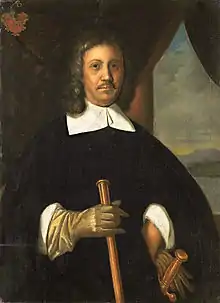1619
1619 (MDCXIX) was a common year starting on Tuesday of the Gregorian calendar and a common year starting on Friday of the Julian calendar, the 1619th year of the Common Era (CE) and Anno Domini (AD) designations, the 619th year of the 2nd millennium, the 19th year of the 17th century, and the 10th and last year of the 1610s decade. As of the start of 1619, the Gregorian calendar was 10 days ahead of the Julian calendar, which remained in localized use until 1923.
| Millennium: | 2nd millennium |
|---|---|
| Centuries: | |
| Decades: | |
| Years: |
| 1619 by topic |
|---|
| Arts and science |
|
| Leaders |
|
| Birth and death categories |
| Births – Deaths |
| Establishments and disestablishments categories |
| Establishments – Disestablishments |
| Works category |
|
| Gregorian calendar | 1619 MDCXIX |
| Ab urbe condita | 2372 |
| Armenian calendar | 1068 ԹՎ ՌԿԸ |
| Assyrian calendar | 6369 |
| Balinese saka calendar | 1540–1541 |
| Bengali calendar | 1026 |
| Berber calendar | 2569 |
| English Regnal year | 16 Ja. 1 – 17 Ja. 1 |
| Buddhist calendar | 2163 |
| Burmese calendar | 981 |
| Byzantine calendar | 7127–7128 |
| Chinese calendar | 戊午年 (Earth Horse) 4315 or 4255 — to — 己未年 (Earth Goat) 4316 or 4256 |
| Coptic calendar | 1335–1336 |
| Discordian calendar | 2785 |
| Ethiopian calendar | 1611–1612 |
| Hebrew calendar | 5379–5380 |
| Hindu calendars | |
| - Vikram Samvat | 1675–1676 |
| - Shaka Samvat | 1540–1541 |
| - Kali Yuga | 4719–4720 |
| Holocene calendar | 11619 |
| Igbo calendar | 619–620 |
| Iranian calendar | 997–998 |
| Islamic calendar | 1028–1029 |
| Japanese calendar | Genna 5 (元和5年) |
| Javanese calendar | 1539–1540 |
| Julian calendar | Gregorian minus 10 days |
| Korean calendar | 3952 |
| Minguo calendar | 293 before ROC 民前293年 |
| Nanakshahi calendar | 151 |
| Thai solar calendar | 2161–2162 |
| Tibetan calendar | 阳土马年 (male Earth-Horse) 1745 or 1364 or 592 — to — 阴土羊年 (female Earth-Goat) 1746 or 1365 or 593 |
Events
January–June
- January 12 – James I of England's Banqueting House, Whitehall in London is destroyed by fire.[1] Inigo Jones is commissioned to design a replacement.
- February 14 – Earthquake flattens the town of Trujillo, Peru, killing hundreds in the town and causing landslides in the surrounding countryside killing hundreds more.[2]
- March 20 – Matthias, Holy Roman Emperor dies, leaving the Holy Roman Empire without an official leader, to deal with the Bohemian Revolt.
- April – Battle of Sarhu: Manchu leader Nurhaci is victorious over the Ming forces.[3]
- May 8 – The Synod of Dort has its final meeting.
- May 13 – Dutch statesman Johan van Oldenbarnevelt is executed in The Hague, after having been convicted of treason.
- May 30 – Jan Pieterszoon Coen, Governor General of the Dutch East Indies, conquers Jayakarta, and renames it Batavia.
- June 10 – Thirty Years' War – Battle of Sablat: Protestant forces are defeated.[4]
- June 21 – Dulwich College founded by Edward Alleyn, in Dulwich, London.[5]
July–December
- July 30 – In Jamestown, Virginia, the first English-speaking representative assembly in the Americas, the Virginia General Assembly (later named House of Burgesses), convenes for the first time.[6]
- August 5 – Thirty Years' War: Battle of Věstonice – Bohemian forces defeat the Austrians.
- August 10 – The Treaty of Angoulême ends the civil war between Louis XIII of France and his mother, Marie de' Medici.
- August 20 – A group "twenty and odd" enslaved Africans onboard the privateer ship White Lion are landed (the first in the state of Virginia) at Point Comfort in colonial Virginia.[7][8]
- August 26 – Frederick V of the Palatinate is elected King of Bohemia by the states of the Bohemian Confederacy.
- August 28 – Ferdinand II, Archduke of Austria and King of Bohemia, is elected Holy Roman Emperor unanimously by the prince-electors.
- October 8 – Thirty Years' War – The Treaty of Munich is signed by Ferdinand II and Maximilian I, Elector of Bavaria.[9]
- November 16 – William Parker School, Hastings, England, is founded by the will of Reverend William Parker.
- November 23 – Thirty Years' War: Battle of Humenné – Polish Lisowczycy troops assist the Holy Roman Emperor by defeating a Transylvanian force, forcing Gabor Bethlen to raise his siege of Vienna.
- December 4 – Thirty-eight colonists from England disembark in Berkeley Hundred, Virginia from the Margaret of Bristol and give thanks to God (considered by some to be the first Thanksgiving in the Americas).
Date unknown
- Jahangir grants a British mission important commercial concessions at Surat, on the west coast of India.
- Salé Rovers declare the port of Salé on the Barbary Coast to be the Republic of Salé, independent of the Sultan of Morocco, with the Dutch-born corsair Jan Janszoon as president.
- The Danish–Dutch whaling settlement of Smeerenburg is founded in Svalbard.
- An expedition in Sri Lanka, led by Filipe de Oliveira, deposes and executes the last Jaffna king (Cankili II), putting an end to the Jaffna Kingdom.
- A Spanish expedition sails around Tierra del Fuego, mapping the coast and discovering the Diego Ramírez Islands.
Births
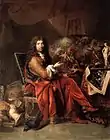
Charles Le Brun
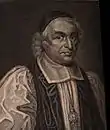
Peter Mews
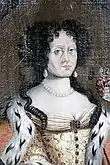
Anna Sophia I, Abbess of Quedlinburg
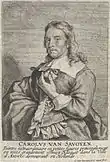
Carel van Savoyen
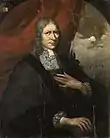
Rijcklof van Goens
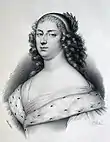
Anne Geneviève de Bourbon
January–March
- January 10 – Philip Sidney, 3rd Earl of Leicester, English politician (d. 1698)
- January 14
- January 17 – Johanna Elisabeth of Nassau-Hadamar, by marriage Princess of Anhalt-Harzgerode (d. 1647)
- January 21
- January 24 – Yamazaki Ansai, Japanese philosopher (d. 1682)
- January 30 – Michelangelo Ricci, Roman Catholic cardinal, mathematician (d. 1682)
- February 1 – Robert Phelips, English politician (d. 1707)
- February 2 – Walter Charleton, English natural philosopher (d. 1707)
- February 9 – Queen Inseon, Korean royal consort (d. 1674)
- February 15 – Tsugaru Nobuyoshi, Japanese daimyō (d. 1655)
- February 24
- February 26 – Francesco Morosini, Doge of Venice from 1688 to 1694 (d. 1694)
- February 28 – Giuseppe Felice Tosi, Italian composer (d. 1693)
- March 2 – Marcantonio Giustinian, 107th Doge of Venice (d. 1688)
- March 5 – Joseph Ames, English naval commander (d. 1695)
- March 6 – Cyrano de Bergerac, French soldier and poet (d. 1655)
- March 13 – Tobias Lohner, Austrian Jesuit theologian (d. 1697)[11]
- March 15 – Jean Le Vacher, French Lazarist missionary and French consul (d. 1683)
- March 20 – Georg Albrecht, Margrave of Brandenburg-Bayreuth-Kulmbach (d. 1666)
- March 25 – Peter Mews, English Royalist theologian and bishop (d. 1706)
- March 28 – Maurice, Duke of Saxe-Zeitz (1657–1681) (d. 1681)
April–June
- April 2
- April 11 – Abraham van der Hulst, Dutch admiral (d. 1666)
- April 21 – Jan van Riebeeck, Dutch founder of Cape Town (d. 1677)
- April 30 – Johannes Spilberg, Dutch painter (d. 1690)
- May
- May 20 – Abiezer Coppe, English "Ranter" and pamphleteer (d. 1672)
- May 24 (bapt.) – Philips Wouwerman, Dutch painter (d. 1668)
- May 26 – King Pye Min of Burma (d. 1672)
- June 13 – Jan Victors, Dutch painter (d. 1676)
- June 14 (bapt.) – Sir Jeffrey Hudson, English court dwarf (d. 1682)
- June 24 – Rijcklof van Goens, Dutch colonial governor (d. 1682)
July–September
- July 3 – Hyojong of Joseon, 17th king of the Joseon Dynasty of Korea (1649–1659) (d. 1659)
- July 13 – Birgitta Durell, Swedish industrialist (d. 1683)
- July 27 – Sir Henry Felton, 2nd Baronet, English Member of Parliament (d. 1690)
- August 5 – Thomas Hall, English politician (d. 1667)
- August 6 – Barbara Strozzi, Italian singer and composer (d. 1677)
- August 7 – Anna Catherine Constance Vasa, Polish princess, daughter of King Sigismund III Vasa (d. 1651)
- August 15
- August 21 – Sir John Borlase, 1st Baronet, English politician (d. 1672)
- August 28
- August 29 – Jean-Baptiste Colbert, French minister of finance (d. 1683)
- September 20 – Sophie Elisabeth Pentz, daughter of Christian IV of Denmark (d. 1657)
- September 21 – Sir John Wray, 3rd Baronet, English politician (d. 1664)
October–December
- October 8 – Philipp von Zesen, German poet (d. 1689)
- October 10
- October 14 – Sir John Bright, 1st Baronet, English politician (d. 1688)
- October 16 – Johann Friedrich König, German Lutheran theologian (d. 1664)
- October 18 – Jean Armand de Maillé-Brézé, French admiral (d. 1646)
- October 27 – Frederick Louis, Count Palatine of Zweibrücken (d. 1681)
- November 5 – Philip de Koninck, Dutch painter (d. 1688)
- November 7 – Gédéon Tallemant des Réaux, French writer known for his Historiettes (d. 1692)
- November 14 – Thomas Howard, 3rd Earl of Berkshire, English politician, earl (d. 1706)
- November 25 – Henry Mildmay, English politician (d. 1692)
- December 10 – Thomas Dyke, English politician (d. 1669)
- December 13 – Andrij Savka, Lemko bandit (d. 1661)
- December 17 – Prince Rupert of the Rhine, Bohemian-born Royalist commander in the English Civil War (d. 1682)
- December 28 – Antoine Furetière, French writer (d. 1688)
- December 31
Date unknown
- Donald Cargill, Scottish Covenanter (d. 1681)
- Gu Mei, politically influential Chinese courtesan, poet and painter (d. 1664)
- Samuel Collins, English doctor and author (d. 1670)
- Francisco Fernández de la Cueva, 8th Duke of Alburquerque, Spanish military officer and viceroy (d. 1676)
- Willem Kalf, Dutch painter (d. 1693)
- Kumazawa Banzan, Japanese philosopher (d. 1691)
- Shalom Shabazi, Jewish Yemeni rabbi and poet (d. c. 1720)
- Wang Fuzhi, Chinese philosopher (d. 1692)
Deaths
_-_Foto_Giovanni_Dall'Orto%252C_6-Apr-2008.jpg.webp)
Lucilio Vanini
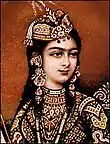
Taj Bibi Bilqis Makani
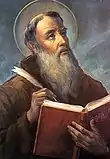
Lawrence of Brindisi
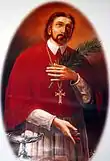
Marko Krizin
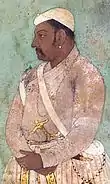
Sur Singh
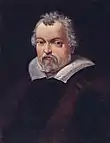
Ludovico Carracci
January–March
- January 7 – Nicholas Hilliard, English miniature painter (b. c. 1547)
- January 11 – Diane de France, Duchess of Angoulême (b. 1538)
- January 15 – Thomas Clinton, 3rd Earl of Lincoln, English politician (b. 1568)
- January 20 – Éléonore de Bourbon, Dutch princess (b. 1587)
- February 3 – Henry Brooke, 11th Baron Cobham, English conspirator (b. 1564)
- February 9 – Lucilio Vanini, Italian philosopher (b. 1585)
- February 12 – Pierre de Larivey, Italian-born French dramatist (b. 1549)
- February 16 – William Couper, Scottish bishop of Galloway (b. 1568)
- March 2
- William Cooke, English politician (b. 1572)
- Anne of Denmark, Queen of James I of England (b. 1574)[12]
- March 5 – Demeter Naprágyi, Hungarian Catholic archbishop (b. 1564)
- March 13 – Richard Burbage, English actor (b. c. 1567)[13]
- March 15
- Michael Balfour, 1st Lord Balfour of Burleigh, Scottish nobleman
- Orsolya Dersffy, Hungarian noble (b. 1583)
- March 18 – Chō Tsuratatsu, Japanese samurai (b. 1546)
- March 20
- Ippolito Galantini, founder of the Congregation of Christian Doctrine of Florence (b. 1565)
- Matthias, Holy Roman Emperor, Austrian Habsburg ruler (b. 1557)
April–June
- April 5 – Alexander Home, 1st Earl of Home, Scottish nobleman (b. 1566)
- April 10 – Thomas Jones, Anglican Archbishop of Dublin (b. c. 1550)
- April 16 – Denis Calvaert, Flemish painter (b. 1540)
- April 18 – Taj Bibi Bilqis Makani, Mughal empress (b. 1573)
- April/May – William Larkin, English court portrait painter (b. early 1580s)
- May – John Overall, English bishop (b. 1559)
- May 13 – Johan van Oldenbarnevelt, Dutch statesman (b. 1547)
- May 21 – Hieronymus Fabricius, Italian anatomist (b. 1537)
- May 23 – Stephen Soame, Lord Mayor of London (b. 1540)
- June 18 – Martin Fréminet, French painter (b. 1567)
July–September
- July 2 – Francis II, Duke of Saxe-Lauenburg (1586–1619) (b. 1547)
- July 22 – Lawrence of Brindisi, Italian saint (b. 1559)
- July 24 – Nabeshima Naoshige, Japanese samurai (b. 1537)
- August 3 – Dorothy Percy, Countess of Northumberland, younger daughter of Walter Devereux (b. c. 1564)
- August 19
- Thomas Dale, English colonial governor
- Jørgen Lunge, Danish politician (b. 1577)
- August 29 – Ferdinando Taverna, Italian Catholic cardinal (b. 1558)
- August 30 – Shimazu Yoshihiro, Japanese samurai and warlord (b. 1535)
- September – Hans Lippershey, Dutch lensmaker (b. 1570)
- September 3 – John Gordon, Scottish bishop (b. 1544)
- September 7
October–December
- October
- October 9 – Joseph Pardo, Italian rabbi and merchant (b. c. 1561)
- October 14 – Samuel Daniel, English poet (b. 1562)
- October 18 – Petrus Gudelinus, Belgian jurist (b. 1550)
- October 19 – Fujiwara Seika, Japanese philosopher (b. 1561)
- November 13 – Ludovico Carracci, Italian painter (b. 1555)
- December 23 – John Sigismund, Elector of Brandenburg from the House of Hohenzollern (b. 1572)
- December 29
References
- "Fires, Great", in The Insurance Cyclopeadia: Being an Historical Treasury of Events and Circumstances Connected with the Origin and Progress of Insurance, Cornelius Walford, ed. (C. and E. Layton, 1876) p. 29
- Robert L. Kovach; Robert Louis Kovach (2004). Early Earthquakes of the Americas. Cambridge University Press.
- Oriens extremus: Zeitschrift für Sprache, Kunst und Kultur de Länder des Fernen Ostens. O. Harrassowitz. 1981. p. 32.
- Richard Ernest Dupuy; Trevor Nevitt Dupuy (1986). The Encyclopedia of Military History from 3500 B.C. to the Present. Harper & Row. p. 534. ISBN 978-0-06-181235-4.
- Schools inquiry commission (1868). Report of the commissioners. p. 109.
- "The First Legislative Assembly, Historic Jamestowne". Colonial National Historical Park. U.S. National Park Service. July 22, 2019. Retrieved August 3, 2019.
- Brown, DeNeen L (August 24, 2018). "Slavery's bitter roots: In 1619, '20 And odd Negroes' arrived in Virginia". The Washington Post. Retrieved January 9, 2019.
- "The First Africans". Jamestowne Rediscovery. Historic Jamestowne. Retrieved August 18, 2019.
- Kenneth Meyer Setton (1991). Venice, Austria, and the Turks in the Seventeenth Century. American Philosophical Society. p. 34. ISBN 978-0-87169-192-7.
- Joanna Banham (May 1997). Encyclopedia of Interior Design. Routledge. p. 730. ISBN 978-1-136-78758-4.
- Faith K. Pizor; T. Allan Comp (1971). The Man in the Moone: And Other Lunar Fantasies. Praeger. p. 59. ISBN 978-0-283-97815-9.
- Jennifer Woodward (1997). The Theatre of Death: The Ritual Management of Royal Funerals in Renaissance England, 1570-1625. Boydell & Brewer Ltd. p. 166. ISBN 978-0-85115-704-7.
- Irwin Smith (1964). Shakespeare's Blackfriars Playhouse: Its History and Its Design. New York University Press. p. 257. ISBN 978-0-8147-0483-7.
This article is issued from Wikipedia. The text is licensed under Creative Commons - Attribution - Sharealike. Additional terms may apply for the media files.
(1619%252C_Claes_Jansz._Visscher).jpg.webp)
